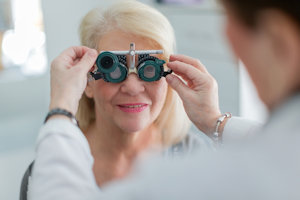What is Macular Degeneration?
What is Macular Degeneration? How is it detected? Is there a cure for the condition? Get all the answers you need from the experts at Elmquist Eye Group.

About Macular Degeneration
Age-Related Macular Degeneration, otherwise known as AMD, is a common eye condition that affects a part of the retina called the macula, which enables you to see fine detail to read or drive. There are two forms:
- Dry AMD – Nearly 90% of individuals with AMD have the dry form of the condition, and all patients with wet AMD had the dry form first. Scientists are still not sure about what causes it, but research suggests that part of the retina becomes diseased, leading to the slow breakdown of the macular cells and a gradual loss of central vision.
- Wet AMD – Wet AMD is less common than Dry AMD, but is responsible for more serious vision loss. Wet AMD occurs when new blood vessels grow underneath the retina and leak blood and fluid under the macula. This causes permanent damage to the macula and can result in blind spots in your central vision.
Diagnosing Macular Degeneration
There are several tests your eye doctor can perform to determine if you have Macular Degeneration, including:
Dilated eye exam: After dilating (widening) your pupils with eye drops, we will examine your retina and optic nerve for signs of AMD and other eye problems.
Amsler grid: This test can help detect early signs of retinal disease. If you have Macular Degeneration, some of the straight lines in the grid will look faded, broken or distorted.
Ophthalmoscopy or fundoscopy: Your eye doctor can use an ophthalmoscope or fundoscope to check for problems in the retina, blood vessels and optic nerve after dilating your pupils with eye drops.
Fluorescein angiography: If your doctor suspects you may have the more advanced Wet AMD, he or she may perform this test to detect leaking blood vessels. It involves injecting a colored dye into your arm and tracing it as it travels through your blood vessels.
Optical coherence tomography (OCT): When your doctor suspects advanced Dry AMD, this technique can identify regions of the retina that are thinning, thickening or swelling.
Treatment for Macular Degeneration
There is no cure for AMD; however there are treatments that may help delay its progression or even improve vision. Changes in diet and nutrition may keep Dry AMD from getting worse. Wet AMD can be treated with laser surgery, photodynamic therapy (PDT) with or without injection of steroids into the eye, and drugs that are painlessly injected into the eye.
If the doctors at Elmquist Eye Group examine your eyes and determine that you have macular degeneration, we may refer you to a retinal specialist for treatment.
To learn more about macular degeneration and what you can do to reduce your risk of serious vision loss, call Elmquist Eye Group at (239) 936-2020 to schedule an appointment
